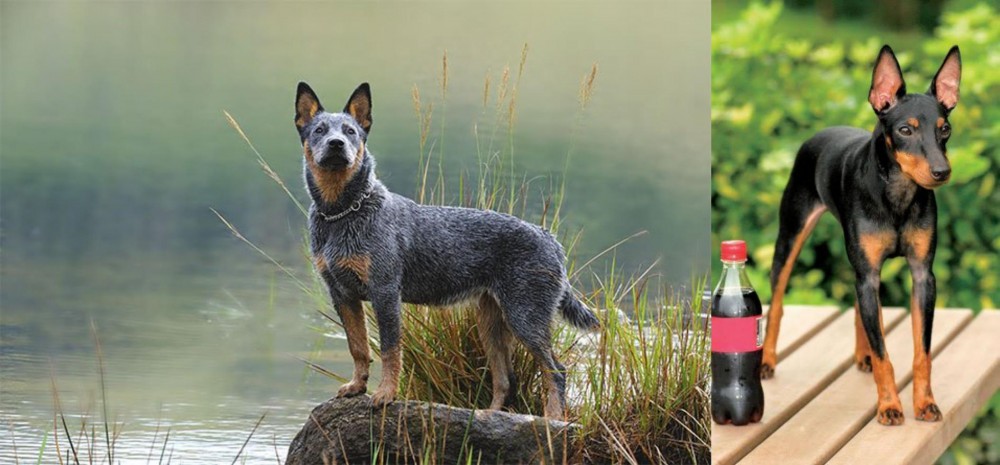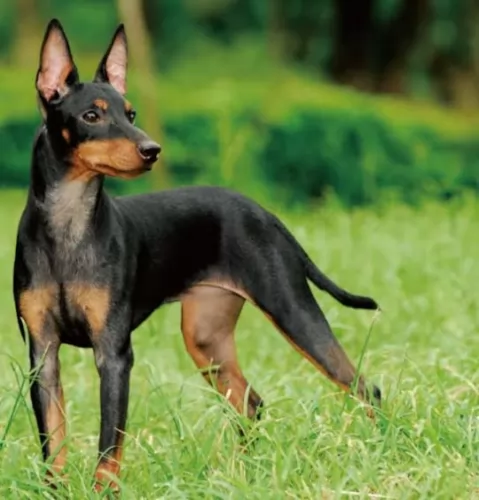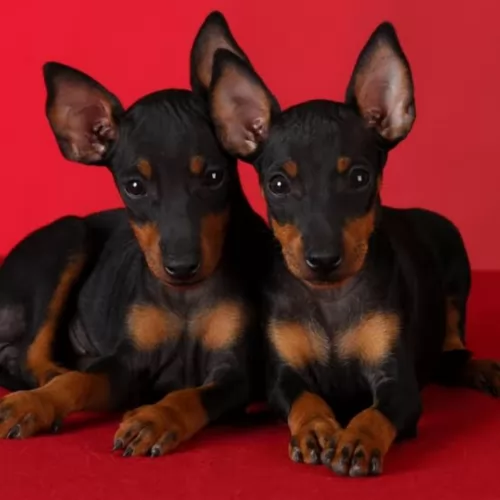 Petzlover
Petzlover Blue Healer is originated from Australia but Toy Manchester Terrier is originated from United Kingdom. Blue Healer may grow 21 cm / 9 inches higher than Toy Manchester Terrier. Blue Healer may weigh 18 kg / 40 pounds more than Toy Manchester Terrier. Both Blue Healer and Toy Manchester Terrier has almost same life span. Both Blue Healer and Toy Manchester Terrier has almost same litter size. Both Blue Healer and Toy Manchester Terrier requires Low Maintenance.
Blue Healer is originated from Australia but Toy Manchester Terrier is originated from United Kingdom. Blue Healer may grow 21 cm / 9 inches higher than Toy Manchester Terrier. Blue Healer may weigh 18 kg / 40 pounds more than Toy Manchester Terrier. Both Blue Healer and Toy Manchester Terrier has almost same life span. Both Blue Healer and Toy Manchester Terrier has almost same litter size. Both Blue Healer and Toy Manchester Terrier requires Low Maintenance.
 It was in 1802 that George Hall arrived in New South Wales, establishing 2 cattle stations. He had a problem – getting his thousands of cattle to the Sydney markets. He began looking at the prospect of a droving dog and imported a number of dogs of which a blue mottled dog emerged.
It was in 1802 that George Hall arrived in New South Wales, establishing 2 cattle stations. He had a problem – getting his thousands of cattle to the Sydney markets. He began looking at the prospect of a droving dog and imported a number of dogs of which a blue mottled dog emerged.
The dogs were crossed with dingoes and by 1840 the Halls Heelers were used by the Halls. However with the death of one of the Halls, their cattle stations went to action and the dogs, the Halls Heelers became available.
The dogs attracted attention, and the term ‘Australian Cattle Dog’ was adopted. The name referred to those dogs coming from Thomas Hall's ‘Heelers’. There have been many arguments about the origin of the breed, but the red or blue offspring known as Hall's Heelers were proven cattle drovers, and with further breeding experiments which included the Australian Kelpie, dingoes and the Dalmation, by 1893, the tough, robust working breed known as the Blue Heeler or the Australian Cattle Dog came about.
 The Toy Manchester Terrier comes from Manchester and came about by breeding the Manchester Terrier with smaller dog breeds.
The Toy Manchester Terrier comes from Manchester and came about by breeding the Manchester Terrier with smaller dog breeds.
Looking like a Doberman Pinscher, the American Toy Manchester Terrier Club was formed in the 1930s and the dog was recognized in 1938 by the American Kennel Club.
It is believed that the Black and Tan Terrier was also possibly crossed with Whippets. The dog is categorized as a Terrier or as a Toy breed.
 Blue Heelers are medium-sized, sturdy, compact dogs who are somewhat longer than tall. The female Blue Heeler measures roughly 43–48cm at the withers, while the male measures about 46–51cm. If your Blue Heeler is in tip top condition, he’ll weigh about 15 to 22 kilograms. They are muscular with pointed, erect ears, dark eyes and long tails which are mostly hanging downwards. Their dense coats are blue- or red speckled and sometimes with tan markings.
Blue Heelers are medium-sized, sturdy, compact dogs who are somewhat longer than tall. The female Blue Heeler measures roughly 43–48cm at the withers, while the male measures about 46–51cm. If your Blue Heeler is in tip top condition, he’ll weigh about 15 to 22 kilograms. They are muscular with pointed, erect ears, dark eyes and long tails which are mostly hanging downwards. Their dense coats are blue- or red speckled and sometimes with tan markings.
The Blue Heeler is a ball of energy and he is clever too. You won’t find him sitting around for too long, and if there is sign of a walk or a ball game, he’s in! He is an independent dog, and although he makes a wonderful family pet, he tends to attach himself to that one special person in his life. He is a natural watchdog and protector of his human family.
 Looking much like a small Doberman Pinscher, the Manchester Terrier is the miniature version of the standard Manchester.
Looking much like a small Doberman Pinscher, the Manchester Terrier is the miniature version of the standard Manchester.
He weighs in the region of 2 to 5kg and stands at between 25 and 30cm in height. He has a sleek, short coat which is black and tan. He is lithe and muscular, bred back in the day to kill vermin. He has large, broad erect ears which taper to a point.
The Toy Manchester Terrier is a gentle but energetic dog, a great choice for an active family. Throw a ball and you’ll see how he loves to give chase, and he’ll also love his walk every day.
They’re adaptable too, so if you live in the countryside or the city, he can be your friend and companion there.
Training and socialization are excellent for all dogs, particularly ones with a stubborn, independent streak such as with this dog. He is intelligent and will learn quickly. They’re alert too so you can expect him to be a good watchdog.
 Training and socializing of your Blue Heeler will ensure that your dog does what you want him to. The Blue Heeler is an intelligent, responsive dog and training can benefit him, turning him into an outstanding family pet, good with children and other pets in the home.
Training and socializing of your Blue Heeler will ensure that your dog does what you want him to. The Blue Heeler is an intelligent, responsive dog and training can benefit him, turning him into an outstanding family pet, good with children and other pets in the home.
He is a playful, affectionate pet who doesn’t take easily to strangers, and this is what makes him such an excellent guard dog.
Your Blue Heeler is not an apartment dog as he requires a lot of exercise, and cooping him indoors for too long with nothing to do can lead to destructive behavior.
Head-strong, independent and robust, your Blue Heeler will need a firm owner who is boss. Add to the firm owner a lot of love and care, and you’ll have a devoted friend.
 The Toy Manchester Terrier is full of beans and will provide you with lots of fun. They're sociable and love being in the presence of their human family.
The Toy Manchester Terrier is full of beans and will provide you with lots of fun. They're sociable and love being in the presence of their human family.
They get on well with kids and pets in the home and are brave, alert and feisty. He may be small, but he is full of personality and he’s just waiting to fill your home with his bright charm, promising to be a loyal, loving pet.
 Australian cattle dogs are healthy and can live up to 15 years of age, but even so there are some genetic conditions that you will need to be aware of following
Australian cattle dogs are healthy and can live up to 15 years of age, but even so there are some genetic conditions that you will need to be aware of following
Eye issues which includes progressive retinal atrophy – this disease is an inherited disease of the retina of the eye where the rod cells are destined to die. Fortunately it is not painful for the dog. There are different types of inherited retinal degenerative diseases in dogs but going into detail with them is beyond the scope of this article. For more information you can chat to your vet.
Recessive piebald elleles - the Blue Heeler has recessive piebald alleles which can produce white in the skin and coat and which is linked to congenital hereditary deafness.
 The Toy Manchester Terrier is a healthy dog breed and can reach anything between 14 and 16 years of age. Good food and exercise can stave off illness, but there are some common dog illnesses that any dog can succumb to.
The Toy Manchester Terrier is a healthy dog breed and can reach anything between 14 and 16 years of age. Good food and exercise can stave off illness, but there are some common dog illnesses that any dog can succumb to.
This occurs when there are problems with the thyroid hormone. You might find skin problems with your pet, lethargy and even hair loss. Your vet might suggest hormone replacement, but there are always natural products for dogs too.
This is when there is degeneration of the head on the femur bone so that there is also joint inflammation.
It is thought that the condition is brought on by problems with blood supply to the femoral head. Lameness sets in and then your vet will want a medical history of your pet’s health.
 Remember that your Blue Heeler was once a full time cattle dog where he used to become totally and utterly exhausted from herding cattle. This is what he loved – the activity. If you have a Blue Heeler, you will need to provide him with plenty of exercise.
Remember that your Blue Heeler was once a full time cattle dog where he used to become totally and utterly exhausted from herding cattle. This is what he loved – the activity. If you have a Blue Heeler, you will need to provide him with plenty of exercise.
If you live on a farm, your Blue Heeler will be in his element because he can run, walk and swim to his heart’s content. If you keep your Blue Heeler in your back garden, you will need to provide him with ball games, rope games, long walks, running on a leash as you cycle and other activities.
Your Blue Heeler has a short, weather-resistant double coat. He’s not a heavy shedder, but he will have his share of seasonal shedding, so it’s a good idea to get into the habit of brushing him at least twice a week. This will get rid of all those loose hairs and keep his skin healthy by getting the blood flowing and distributing his natural oils.
Giving the best dog food for your Blue Heeler will come from either your home made food or a top quality commercially manufactured dog food. He is such a high energy dog, that your veterinarian can advise you on a dog food specially designed for high energy breeds.
These foods are well balanced and are enriched with amino acids and vitamins, promoting healthy bones and joints. Remember to include some raw meat into your dog’s diet and to ensure a constant source of cool, fresh water.
Ensure your Blue Heeler’s ongoing health by paying attention to ears, nails and teeth.
 Make sure you provide your pet with yard space and that he is well exercised and occupied. Provide him with exercise and give him attention.
Make sure you provide your pet with yard space and that he is well exercised and occupied. Provide him with exercise and give him attention.
Provide him with a dry, quiet resting place. If he spends time outdoors, he must have shade and sun as well as shelter from the rain.
Provide him with good food in his own special bowls. If you feed him dry kibble, make sure to give him a quality one with vitamins and minerals. The food’s labeling will guide you as to what to buy, but your vet is also a good source of useful information. Try to give him some home-made food too. Boiled chicken, brown rice, sweet potatoes and spinach for instance, are excellent examples. Dont add in exotic spices and curries that can give him an upset stomach. Make sure he has a constant supply of fresh, cool water.
Get your Manchester to the vet if he is ill. Make sure his vaccines are up to date.
He has short hair and is a low maintenance dog. Brush him once or twice a week to keep his shiny coat healthy. Check inside his ears for redness and give him a good check-over to make sure he doesn’t have any odd looking lumps or sores on his body.